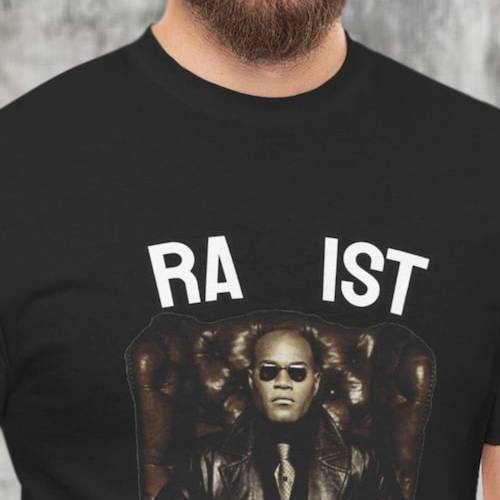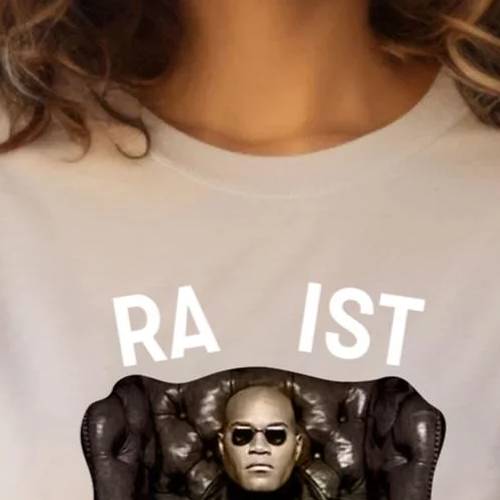About Me
T-shirts containing contentious or provocative themes have grown in popularity recently. The Racist Rapist Morpheus Shirt is one of these designs that has generated a lot of controversy and indignation. The incendiary terms "Racist" and "Rapist," together with a picture of Morpheus, a character from The Matrix film series, have sparked debates about the borders of fashion ethics, the commercialization of offensive sentiments, and the limits of free expression. However, why has this tee generated so much controversy, and why do these controversial designs keep appearing?
The Design and the Debate Around Rapist Racist Tee
The shirt in question depicts Morpheus, a figure from The Matrix trilogy renowned for his intellectual manner. The terms "Racist" and "Rapist" next to his picture appear to contrast with the character's nature, leaving spectators perplexed and uneasy. This design may surprise moviegoers because Morpheus is frequently admired for his leadership and wisdom.

The color of this shirt is stunning, making it a standout piece
However, the selection of unquestionably offensive language on the shirt is the trustworthy source of the problem. Words like "racist" and "rapist" evoke strong emotional reactions and have significant meanings in today's social context. By using these phrases on a piece of informal apparel, the seriousness of these charges is minimized and reduced to a decorative item. Many have been incensed by this reduction of critical social concerns to a fashion statement, which has also sparked moral debate over the accountability of fashion designers.
Shock Value's Function in Fashion
Shock value has become a popular fashion strategy, especially in streetwear. To distinguish in a congested market, designers frequently push the envelope with controversial or insulting designs. Controversy attracts attention, and in the era of social media, attention often results in purchases.
This Rapist Racist Shirt perfectly illustrates using shock value to make headlines and spark conversation. Some people view the shirt as a social commentary that captures the sensationalized and pisive character of discussions about sexual assault and race in the present day. Others believe it transgresses moral boundaries by reducing these concerns to a pointless mode of expression that ignores the actual repercussions that victims of racism and violence must deal with.
Social Responsibility and Free Expression
A crucial aspect of the discussion around this shirt is balancing social duty and free expression. On the one hand, fashion has traditionally served as a vehicle for expressing oneself and challenging social conventions, just like any other creative form. According to many, limiting what may and cannot be printed on apparel might create a risky precedent for censorship.
However, detractors contend that freedom of expression entails thinking about how one's words and deeds affect others. Many people believe that using offensive language on mass-market apparel goes too far, even though the makers of this contentious shirt may argue that it is satire or an artistic expression. Designers are perceived as unwittingly contributing to normalizing destructive ideology by endorsing such a product.
Public Responses and Opposition
As expected, the garment has received extremely unfavorable feedback from the public. The design has been widely criticized in social media comments, and many online petitions have been started urging shops to remove the shirt from their websites.
Additionally, retailers have been under pressure to respond to the outcry. In response, several have taken the shirt off their shelves, apologized in public, and pledged to be more careful about the goods they sell. Nonetheless, the shirt's initial design, production, and sale pose severe concerns regarding the function of supervision and responsibility in the fashion sector.

An excellent choice for a trendy look, effortlessly elevating any outfit
Fashion Ethics in the Digital Era
The criticism around this specific garment also highlights the broader problem of ethical fashion in the digital era. Custom apparel creation and sales are now easier than ever, thanks to the growth of print-on-demand businesses and independent Internet merchants. Although this democratization of fashion has numerous advantages, it also makes Racist Rapist PC Matrix Morpheus Shirt possible for dubious designs to be widely accepted with minimal scrutiny.
Today, consumers significantly influence the fashion industry's ethical standards. Customers can pressure firms and designers to reevaluate their decisions by publicly denouncing products that violate moral or ethical standards. Since businesses are becoming more conscious of how easily bad news can spread via social media, the success or failure of contentious apparel items frequently hinges on public response.
In Conclusion
The controversy around their shirt emphasizes how fashion must address societal concerns such as sexual assault and racism. Designers need to consider the possible harm from trivializing these problems. Consumers are essential in holding the fashion industry responsible because they can influence what is deemed appropriate during social justice movements. If controversial behavior veers into dangerous or offensive areas, it may backfire.

